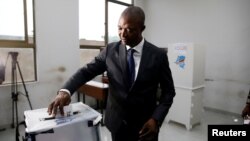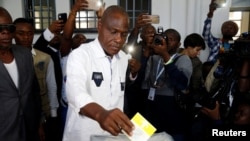People in Congo have begun voting in a long-delayed presidential election that could bring the troubled country’s first peaceful, democratic transfer of power.
In the capital, voters who turned out early were met with a violent storm that knocked out the power in two polling stations visited by Reuters.
Hours after the election began, scores of polling stations had yet to open, the electoral commission chief confirmed Sunday, as he faced shouts of “We wanted to vote!” and frustrated people walked away.
Delays were reported in other polling stations in the capital, Kinshasa, and other parts of this vast country.
Adding to that fear of unrest is a last-minute decision to bar an estimated 1 million people from voting because of a deadly Ebola virus outbreak in the east. The decision has been widely criticized as threatening the credibility of the election.
Candidates vote
Two main opposition candidates, Martin Fayulu and Felix Tshisekedi, are challenging President Joseph Kabila’s preferred successor, the European Union-sanctioned former Interior Minister Emmanuel Ramazani Shadary.
Kabila and Shadary have voted and Kabila urged others to vote: “My message today to my compatriots is to come and vote for their candidates and brave the rain.”
Shadary called for “peace and calm,” adding “I am very confident in victory because the Congolese people will trust me, I campaigned all over the country.”
Opposition candidate Fayulu voted in the same polling station where Kabila and Shadary voted earlier.
“It is the departure ticket for Kabila” said Fayulu as he cast his ballot. “Today, we are writing the end of Kabila, the end of misery for Congolese people. Congo will stop being the laughing stock of the world and we think the results will be in accordance with what the Congolese people want.”
Electronic voting machines
Congo’s 40 million registered voters are using electronic voting machines with touch screens for the first time, machines the opposition fears could be manipulated.
“The majority of voters here are stressed,” said Kayembe Mvita Dido, first in a line of dozens waiting to vote at a polling station in the shadows of the towering Nyiragongo volcano. “Some do not even know how to use the voting machine,” he said, referring to a new electronic voting system.
Some Congolese observers have said voting materials didn’t reach some polling stations in time.
At stake is a country rich in minerals, including those crucial to the world’s smartphones and electric cars, and yet Congo remains desperately underdeveloped. Corruption and insecurity are widespread.
In the capital, Kinshasa, at the Institut de la Gombe polling station in the center of the city, a few people began to vote. This station is where the ruling party’s candidate, Shadary, and Kabila, are expected to vote. There is a poster at the entrance explaining how to use the electronic voting machines.






